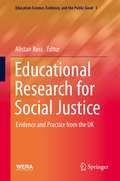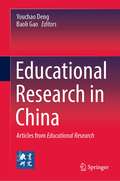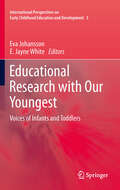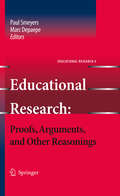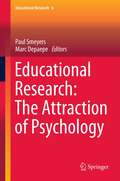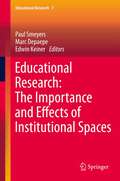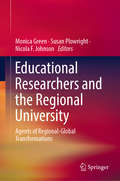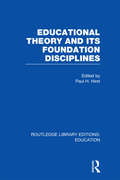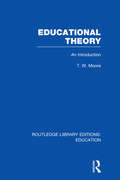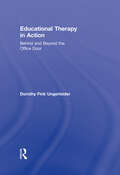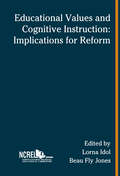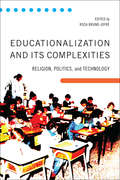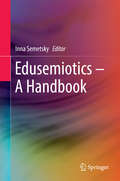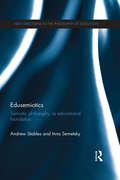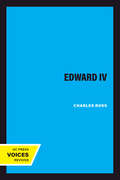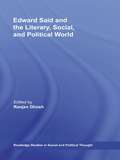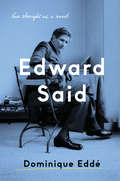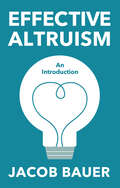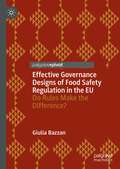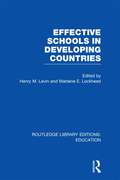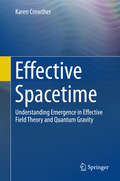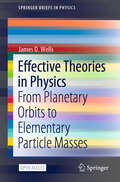- Table View
- List View
Educational Research for Social Justice: Evidence and Practice from the UK (Education Science, Evidence, and the Public Good #1)
by Alistair RossThis book presents a series of analyses of educational policies – largely in the UK, but some also in Europe – researched by a team of social scientists who share a commitment to social justice and equity in education. We explore what social justice means, in educational policy and practice, and how it impacts on our understanding of both ‘educational science’ and ‘the public good’. Using a social constructivist approach, the book argues that social justice requires a particular and critical analysis of the meaning of meritocracy, and of the way this term turns educational policies towards treating learning as a competition, in which many young people are constructed as ‘losers’. We discuss how many terms in education are essentialised and have specific, and different, meanings for particular social groups, and how this may create issues in both quantitative survey methods and in determining what is ‘the public good’. We discuss social justice across a range of intersecting social characteristics, including social class, ethnicity and gender, as they are applied across the educational policy spectrum, from early years to postgraduate education. We examine the ways that young people construct their identities, and the implications of this for understanding the ‘public good’ in educational practice. We consider the responsibilities of educational researchers to acknowledge these issues, and offer examples of researching with such a commitment. We conclude by considering how educational policy might contribute to a socially just, equitable and inclusive public good.
Educational Research in China: Articles from Educational Research
by Youchao Deng Baoli GaoThe articles in this book are from Educational Research—the top academic journal in the field of education research in China. It covers education theory and philosophy, basic education, education economy and management and other fields, focusing on the hot and frontier issues of Education in China 2019, such as the development of artificial intelligence and education, the contribution of education to green GDP, rural education teams and policies, vocational education development, and so on.Educational researchers in the college and university, educational policy makers and frontline teaching staff would be interested in it. By focusing on the current hot issues and frontier education issues, the book explores the deep theoretical basis behind the phenomenon, so as to establish in the reader’s mind the connections between theory and practice, China and world.
Educational Research with Our Youngest
by E. Jayne White Eva JohanssonInterpreting the voices of under three year olds is central to early childhood education. Yet entering into their life-worlds is fraught with challenges and unrealised possibilities. This ground-breaking book generates a dialogue about the multiple ways researchers have exploited a range of methods for approaching, accessing, understanding and interpreting infant voice. Each chapter explores the kinds of ethical considerations and dilemmas that may arise in this process. The book itself represents a chorus of international voices (researchers, children, teachers and parents), all adding to a discussion about various circumstances, dilemmas and possibilities involved in doing research with our youngest. This book is an essential read for researchers and teachers alike who seek to 'listen' and 'see' very young children with fresh ears and eyes.
Educational Research: Proofs, Arguments, and Other Reasonings
by Paul Smeyers Marc DepaepeThis book focuses on the language of educational research as well as on the language of education. It conceives both as social practices and investigates how rhetoric plays a part in the complex process of historically situated argumentation. The book aims to answer such questions as: 'What is the nature of the arguments and the kinds of sources one relies on?' and 'What kind of reasoning is offered to convince practitioners?' Taking postmodern criticism seriously, the contributors argue that the scholar or researcher cannot indulge in relativism or be satisfied with a description of particular cases. Instead, theoreticians as well as practitioners have to engage in sound thinking and dialogue. The chapters in this volume highlight relevant characteristics of the language of educational research. In addition, attention is paid to the language of particular debates which figure prominently in the wider educational context, such as the language of goals, of parenting, citizenship and capability.
Educational Research: The Attraction of Psychology
by Paul Smeyers Marc DepaepeThe closely argued and provocative contributions to this volume challenge psychology's hegemony as an interpretive paradigm in a range of social contexts such as education and child development. They start from the core observation that modern psychology has successfully penetrated numerous domains of society in its quest to develop a properly scientific methodology for analyzing the human mind and behaviour. For example, educational psychology continues to hold a central position in the curricula of trainee teachers in the US, while the language of developmental psychology holds primal sway over our understanding of childrearing and the parent-child relationship. Questioning the default position of modern psychology as a way of conceptualizing human relations, this collection of papers reexamines key assumptions that include psychology's self-image as a 'scientific' discipline. Authors also argue that the dogma of neuropsychology in education has demoted concepts such as 'emotion', 'feeling' and 'relationship', so that they are now 'blind spots' in educational theory. Other chapters offer a cautionary analysis of how misshapen notions of psychology can legitimize eugenics (as in Nazi Germany) and poison racial attitudes. Above all, has psychology, with its focus on individual merit, been complicit in hiding the impacts of power and privilege in education? This bracing new volume adopts a broader definition of education and childrearing that admits the essential contribution of the humanities to the proper study of mankind. This publication, as well as the ones that are mentioned in the preliminary pages of this work, were realized by the Research Community (FWO Vlaanderen / Research Foundation Flanders, Belgium) Philosophy and History of the Discipline of Education: Faces and Spaces of Educational Research.
Educational Research: The Importance and Effects of Institutional Spaces
by Paul Smeyers Marc Depaepe Edwin KeinerThis collection of fresh analyses aims to map the links between educational theory and research, and the geographical and physical spaces in which teaching is practiced and discussed. The authors combine historical and philosophical perspectives in examining the differing institutional loci of education research, and also assess the potential and the limitations of each. The contributors trace the effects of 'space' on educational practice in the classroom, in the broader institutions, and in the academic discipline of education--doing so for a range of international contexts. The chapters address various topics relating to the physical and geographical environment. How, for example, does geographical space shape researchers' mental frameworks? How did the learning environments in which young children are taught today evolve? To what extent did parochialism shape America's higher education system? How can our understanding of classroom practice be enhanced by concepts of space? The book acknowledges that texts themselves, as well as the research 'arena', are 'spaces' too, and notes the fascinating debate on the concept of space in the field of mathematics education. Indeed, as more and more students move online, the book analyses the rising importance of virtual spaces such as Web 2.0, which have major educational implications for researchers and students joining the innovative 'virtual' universities of the future. This publication, as well as the ones that are mentioned in the preliminary pages of this work, were realized by the Research Community (FWO Vlaanderen / Research Foundation Flanders, Belgium) Philosophy and History of the Discipline of Education: Faces and Spaces of Educational Research.
Educational Researchers and the Regional University: Agents of Regional-Global Transformations
by Nicola F. Johnson Monica Green Susan PlowrightThis book showcases a compilation of research partnerships produced by the Federation University Gippsland School of Education. Through this book, readers will gain valuable insights into how education research initiatives can help adapt to an age characterized by massive regional/global economic, environmental, identity, cultural and social shifts. The respective chapters address the universal human and researcher condition in a regional setting, highlighting how individuals and groups are seeking to achieve transformation with their regional, educational research. On the whole, the compilation showcases a specific university in a regional context that is now responding to change by rejuvenating, reinventing, re-envisioning and rethinking its research, its identity and its relationality.
Educational Theory and Its Foundation Disciplines (Routledge Library Editions: Education)
by Paul H. HirstAt the time this book was first published the disciplines of philosophy of education, educational psychology, sociology of education and the history of education had developed rapidly. The papers in this volume outline the developments that took place. The first paper analyses the nature of a theory concerned with determining practice and the place of academic disciplines within that. What emerges is the crucial role of these disciplines, but also the need to develop much more adequately a domain of practical principles, assessed and critically reformulated in the light of those disciplines. The following papers are concerned with the contributions four of those disciplines are now making.
Educational Theory: An Introduction (Routledge Library Editions: Education)
by Terence W MooreThis book comes strongly to the defence of educational theory and shows that it has a structure and integrity of its own. The author argues that the validity of educational theory may best be judged in terms of the various assumptions made in it. His argument is illustrated by a review and critique of some particularly influential theories of education: those of Plato, Rousseau, James Mill and John Dewey. He stresses the need for an on-going, contemporary, general theory of education and examines the ways in which the disciplines of psychology, sociology and philosophy can contribute to a general theory of this kind.
Educational Therapy in Action: Behind and Beyond the Office Door
by Dorothy Fink UngerleiderThis book provides an in-depth look at what a little-known clinician, the educational therapist, does and how they do it. It goes behind the clinician’s door to illustrate the unusual and broad range of interventions – both academic/vocational and social/emotional – that an educational therapist employs. This particular case study involves a young woman named Nora who had a severe but undiagnosed auditory processing disorder. She could not give meaning to the spoken language that came at her too rapidly, leaving her in a constant fog of words that she couldn’t comprehend. This case discloses the problems, their causes, and the emotional toll that had to be considered when developing an effective educational/therapeutic plan for Nora. It vividly illustrates the dynamic exchanges and mutual learning that goes on between client and therapist. Parts I and II illustrate how the psycho-educational interventions that addressed Nora’s academic and non-academic needs were gradually formulated over the first year. Part III provides a series of vignettes from subsequent years that illustrate the ongoing applications of the therapist’s work. Distinguishing Features Explanatory Sidebars – The rationale behind particular techniques and interventions is clarified through a system of explanatory sidebars that inform the reader without distracting from the story. This approach makes the book both an instructional tool well as compelling story. Organic Curriculum – The rationale for and application of an "organic (personalized) curriculum" is explained and applied throughout the book as a model for others to use in working with this population. A Longitudinal Perspective – The initial work with Nora began many years ago, so this book provides a long view of her life and tracks the influences that educational therapy exerted on her development into a fully functioning adult. Cognitive/Emotional Integration – The core of educational therapy – the interdependence of cognitive skills and emotional response – is clearly documented throughout the book. In addition to educational therapy students and practitioners, this book is appropriate for those working in related fields such as special education, school psychology, school counselling, and social work in educational settings.
Educational Values and Cognitive Instruction: Implications for Reform
by Beau Fly Jones Lorna IdolThis volume is a comprehensive guide to state-of-the-art research on thinking, cognitive instruction, social values, and reform. Cognitive instruction for at-risk students is discussed in great detail along with a thorough examination of the teaching of thinking skills from the viewpoint of educational values and school culture. The issues of thinking, learning, and cognitive instruction are linked to the educational reform movement from numerous perspectives. Specifically, the reader can better anticipate which aspects of research on thinking will conflict with existing paradigms and which aspects of schooling will be most resistant to change.
Educationalization and Its Complexities: Religion, Politics, and Technology
by Rosa Bruno-JofréThis edited collection brings together scholars from Canadian and international institutions to discuss educationalization, a trend in modern societies that involves transferring social responsibilities onto the school system. This book brings a new dimension to the literature on educationalization by examining the concept in relation to Catholicism, Indigenous issues, the right to education, and historical studies grounded in both Canada and Chile. In these contributions, the book represents an attempt to both deepen the current discussion on the construction and use of educationalization as a concept as well as invite further exploration of this subject in relation to the increasing digitalization of life in the twenty-first century.
Edusemiotics – A Handbook
by Inna SemetskyEdusemiotics is a pioneering area of study that connects semiotics - the science of signs - with educational theory and the philosophy of education. This volume reflects cutting-edge research by scholars in education and in semiotics worldwide, bridging the two discourses to present the state of the art in this new transdisciplinary field. The book's emphasis is on educational theory as based on semiotic philosophy: as such, it challenges the current conception of semiotics in education as merely a sub-branch of applied semiotics. It presents edusemiotics as a novel unified conceptual framework at the interface of theoretical semiotics and educational philosophy, based on both theoretical and empirical studies from around the world. The chapters in this handbook also bring to the fore the intellectual legacy of Charles S. Peirce, John Dewey, Gilles Deleuze, Umberto Eco, Julia Kristeva, Mikhail Bakhtin, Paul Ricoeur, Martin Heidegger and other thinkers, pointing out the implications of edusemiotics for meaningful pedagogy and experiential learning in diverse contexts.
Edusemiotics: Semiotic philosophy as educational foundation (New Directions in the Philosophy of Education #64)
by Inna Semetsky Andrew StablesEdusemiotics addresses an emerging field of inquiry, educational semiotics, as a philosophy of and for education. Using "sign" as a unit of analysis, educational semiotics amalgamates philosophy, educational theory and semiotics. Edusemiotics draws on the intellectual legacy of such philosophers as John Dewey, Charles Sanders Peirce, Gilles Deleuze and others across Anglo-American and continental traditions. This volume investigates the specifics of semiotic knowledge structures and processes, exploring current dilemmas and debates regarding self-identity, learning, transformative and lifelong education, leadership and policy-making, and interrogating an important premise that still haunts contemporary educational philosophy: Cartesian dualism. In defiance of substance dualism and the fragmentation of knowledge that still inform education, the book offers a unifying paradigm for education as edusemiotics and emphasises ethical education in compliance with the semiotic unity between knowledge and action. Chapters contain accessible discussions in the context of educational philosophy and theory, crossing the borders between logic, art, and science together with a provocative theoretical critique. Recently awarded a PESA book award for its contribution to the philosophy of education, Edusemiotics will appeal to an academic readership in education, philosophy and cultural studies, while also being an inspiring resource for students.
Edward IV
by Charles RossThis title is part of UC Press's Voices Revived program, which commemorates University of California Press’s mission to seek out and cultivate the brightest minds and give them voice, reach, and impact. Drawing on a backlist dating to 1893, Voices Revived makes high-quality, peer-reviewed scholarship accessible once again using print-on-demand technology. This title was originally published in 1974.
Edward Said and the Literary, Social, and Political World (Routledge Studies in Social and Political Thought)
by Ranjan GhoshEdward Said is widely recognized for his work as a critic and theorist of Orientalism and the Palestine crisis, but far less attention has been devoted to his considerable body of literary and cultural criticism. In this edited collection, the contributors - many among the foremost Said scholars in the world - examine Said as the literary critic; his relationship to other major contemporary thinkers (including Derrida, Ricoeur, Barthes and Bloom); and his involvement with major movements and concerns of his time (such as music, Feminism, New Humanism, and Marxism). Featuring freshly carved out essays on new areas of intervention, the volume is an indispensable addition for those interested in Edward Said and the many areas in which his legacy looms.
Edward Said: His Thought as a Novel
by Dominique EddeAn intimate account of Edward Saïd's life and thoughtEdward Said is a personal, literary portrait of one of the twentieth century’s most influential scholars, written by his close friend and confidante. Here, Lebanese novelist and essayist Dominique Eddé offers a fascinating and fresh presentation of his oeuvre from his earliest writings on Joseph Conrad to his most famous texts, Orientalism and Culture and Imperialism. Eddé weaves together accounts of the genesis and content of Said’s work, his intellectual development, and her own reflections and personal recollections of their friendship, which began in 1979 and lasted until Said’s death in 2003. In this intimate and searching portrait of Said’s thought, Eddé continues to maintain their dialogue despite his death, trying to make peace with the loss of a collaborator with whom she still wants to talk and disagree.Bringing together personal reflection and theoretical innovation, reflective mourning and immediate argument, Eddé has written a testament to a great intellectual passion.Both specialists of Said’s work and newcomers will find much to learn in this rich portrait of one of the twentieth century’s most important intellectuals.
Effective Altruism: An Introduction
by Jacob BauerAs the world faces increasingly complex problems – from pandemics to global poverty and climate change – how do we decide where to concentrate our efforts and resources to do the most good possible? Effective altruism offers a way to do just that, focusing on evidence and rational arguments to identify crucial issues and the most impactful ways of solving them. In this new book, philosopher Jacob Bauer cuts through the uncritical hype and wholesale dismissal around effective altruism to offer a balanced overview of this movement’s core concepts and approaches to “doing good better.” With examples spanning malaria-preventing bed nets to the dangers of AI, he illuminates how effective altruism is addressing some of the world’s most pressing problems, all the while acknowledging its real limitations and showcasing its immense promise. Whether you are a skeptic or a new adherent seeking to understand the philosophy and community of effective altruism, this book is the definitive guide.
Effective Governance Designs of Food Safety Regulation in the EU: Do Rules Make the Difference?
by Giulia BazzanThis book provides insights on regulatory effectiveness in the field of food safety, by focusing on the variety of institutional factors affecting regulatory outcomes. Drawing upon the Institutional Analysis and Development framework, it investigates differences in effectiveness of food safety regulation and explains them by differences in domestic governance designs, by applying Qualitative Comparative Analysis. The empirical focus of the book is the food safety governance designs of 15 EU Member States, which are investigated through the collection of an original dataset inclusive of measures of independence and accountability of the domestic food safety agencies, of policy capacity and of food safety delivered. The results show the prominent role of the institutional dimension of policy capacity in producing regulatory effectiveness, in conjunction with an integrated model of distribution of the regulatory tasks. As to ineffective governance, the conjunction of low independence or low accountability with low institutional capacity produce ineffective responses.
Effective Kan Fibrations in Simplicial Sets (Lecture Notes in Mathematics #2321)
by Benno van den Berg Eric FaberThis book introduces the notion of an effective Kan fibration, a new mathematical structure which can be used to study simplicial homotopy theory. The main motivation is to make simplicial homotopy theory suitable for homotopy type theory. Effective Kan fibrations are maps of simplicial sets equipped with a structured collection of chosen lifts that satisfy certain non-trivial properties. Here it is revealed that fundamental properties of ordinary Kan fibrations can be extended to explicit constructions on effective Kan fibrations. In particular, a constructive (explicit) proof is given that effective Kan fibrations are stable under push forward, or fibred exponentials. Further, it is shown that effective Kan fibrations are local, or completely determined by their fibres above representables, and the maps which can be equipped with the structure of an effective Kan fibration are precisely the ordinary Kan fibrations. Hence implicitly, both notions still describe the same homotopy theory. These new results solve an open problem in homotopy type theory and provide the first step toward giving a constructive account of Voevodsky’s model of univalent type theory in simplicial sets.
Effective Mathematics of the Uncountable
by Noam Greenberg Joel David Hamkins Denis Hirschfeldt Russell MillerClassical computable model theory is most naturally concerned with countable domains. There are, however, several methods - some old, some new - that have extended its basic concepts to uncountable structures. Unlike in the classical case, however, no single dominant approach has emerged, and different methods reveal different aspects of the computable content of uncountable mathematics. This book contains introductions to eight major approaches to computable uncountable mathematics: descriptive set theory; infinite time Turing machines; Blum-Shub-Smale computability; Sigma-definability; computability theory on admissible ordinals; E-recursion theory; local computability; and uncountable reverse mathematics. This book provides an authoritative and multifaceted introduction to this exciting new area of research that is still in its early stages. It is ideal as both an introductory text for graduate and advanced undergraduate students, and a source of interesting new approaches for researchers in computability theory and related areas.
Effective Schools in Developing Countries (Routledge Library Editions: Education #Vol. 15)
by Henry M. LevinThis volume brings together eight case studies which describe a variety of initiatives to create more effective schools for children of poverty, especially in the Third World. The initiatives reviewed published and unpublished documents and both qualitative and statistical studies were examined. Countries include Brazil, Burundi, Colombia, Ghana, Nepal, Sri Lanka, Thailand and the United States. Each initiative was developed independently to address unique challenges and situations but taken as a group, the features of the approaches described in this volume can be viewed as a basis for considering the development of effective schools strategies in other contexts.
Effective Spacetime
by Karen CrowtherThis book discusses the notion that quantum gravity may represent the "breakdown" of spacetime at extremely high energy scales. If spacetime does not exist at the fundamental level, then it has to be considered "emergent", in other words an effective structure, valid at low energy scales. The author develops a conception of emergence appropriate to effective theories in physics, and shows how it applies (or could apply) in various approaches to quantum gravity, including condensed matter approaches, discrete approaches, and loop quantum gravity.
Effective Theories in Physics
by James D. WellsThere is significant interest in the Philosophy of Science community to understand the role that "effective theories" have in the work of forefront science. The ideas of effective theories have been implicit in science for a long time, but have only been articulated well in the last few decades. Since Wilson's renormalization group revolution in the early 1970's, the science community has come to more fully understand its power, and by the mid-1990's it had gained its apotheosis. It is still one of the most powerful concepts in science, which has direct impact in how one thinks about and formulates theories of nature. It is this power that this Brief sets out to emphasize through historical analysis and current examples.
Effective Theories in Physics: From Planetary Orbits to Elementary Particle Masses (SpringerBriefs in Physics)
by James D. WellsThis open access book…There is significant interest in the Philosophy of Science community to understand the role that "effective theories" have in the work of forefront science. The ideas of effective theories have been implicit in science for a long time, but have only been articulated well in the last few decades. Since Wilson's renormalization group revolution in the early 1970's, the science community has come to more fully understand its power, and by the mid-1990's it had gained its apotheosis. It is still one of the most powerful concepts in science, which has direct impact in how one thinks about and formulates theories of nature. It is this power that this Brief sets out to emphasize through historical analysis and current examples.This is an open access book.
